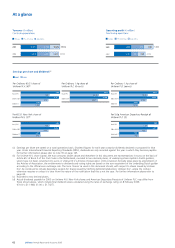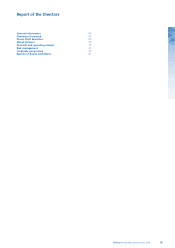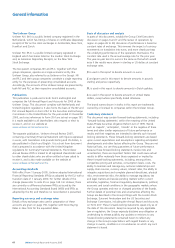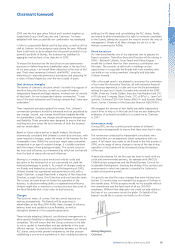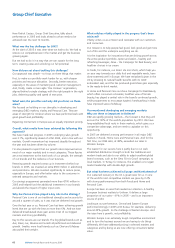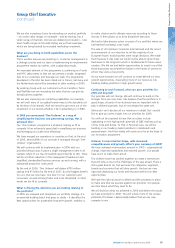Unilever 2005 Annual Report Download - page 15
Download and view the complete annual report
Please find page 15 of the 2005 Unilever annual report below. You can navigate through the pages in the report by either clicking on the pages listed below, or by using the keyword search tool below to find specific information within the annual report.12 Unilever Annual Report and Accounts 2005
About Unilever
(continued)
The RSPO, which includes palm oil growers and processors,
consumer goods manufacturers, retailers, investors and a number
of social and environmental non-governmental organisations, now
has over 100 members. As the largest consumer goods company
on the RSPO Board, we have gained significant insights. Key
developments during 2005 included the adoption of the principles
and criteria for Sustainable Palm Oil Production – elements of
sustainability ensuring that production is economically viable,
environmentally appropriate and socially beneficial.
The widely discussed Dove Campaign for Real Beauty has played a
key role in highlighting the need for a broader, more inclusive
definition of beauty, beyond the stereotypical super-model image.
With our Dove Self-Esteem Fund, which is a cornerstone of the
brand’s long-term growth strategy, we’re going even further.
Together with partners such as the Girl Scouts in the US and the
UK’s Eating Disorder Association, we’re funding educational ‘Body
Talk’ programmes in schools to help young people develop
stronger body-related self-esteem. By 2008 our aim is to have
reached 1 million children.
In Brazil, a recycling project has created jobs and brought
commercial advantages. An exclusive recycling partnership
with a major Brazilian retailer, Pao de Acucar, has not only given
Unilever’s brands greater in-store prominence at no extra cost
but also provided employment to more than 300 local people.
Under the award-winning scheme, a co-operative of local people
collects, recycles and sells used packaging deposited at recycling
stations outside the retailer’s supermarkets. In addition to having
Unilever’s logo on the stations, our participating brands,
Hellmann’s, AdeS, Omo and Rexona, appear on point-of-sale
information and educational materials, raising their profile.
By reducing waste, Unilever has also succeeded in reducing its
costs. Using the same methodology employed in our highly
successful Medusa water conservation programme, we expect to
reduce waste levels for disposal by 30% from our manufacturing
sites in the Asia Africa region between 2005 and 2006. Under our
new Triple ‘R’ (Reduce, Re-use, Recycle) programme, the sites are
collaborating to share best practice and setting targets to reduce
waste levels and disposal costs. In 2006 we’ll launch a similar
initiative, Electra, to reduce energy consumption in Latin America.
The health of our staff is a priority for Unilever worldwide. In
some regions HIV/AIDS poses a serious risk to our employees and
communities. Using the experience gained from dealing with AIDS
in our own workplace over the last 25 years, we have worked in
partnership to share our learning with international bodies such
as the Global Business Coalition on HIV/AIDS. More locally, we
work with groups such as the South African Business Coalition on
HIV/AIDS, with whom we co-developed a well-respected toolkit to
help businesses tackle the disease effectively. In Kenya we have
formed a partnership with the German aid agency GTZ to share
good practice with the wider community, including schools and
smallholder tea growers.
In 2005 we launched a searchable database where consumers can
find out exactly what ingredients are used in our Home and
Personal Care products in Europe. Access to the database is
through Unilever’s website at www.unilever.com/ourvalues.
Visitors select their country and preferred language before
choosing a brand and product. A single click then reveals the full
list of ingredients. Allergy sufferers can check the presence of
ingredients to which they could be sensitive. Further help is
available through the brand carelines (telephone numbers are
listed on the website) and there is additional information on
our website about the chemicals Unilever uses in its products.
Millions of people suffer from heart disease every year. The World
Heart Federation (WHF) is committed to helping the prevention
and control of heart disease and stroke and is made up of over
150 medical societies and heart charities from 100 low and
middle-income countries. We are a key sponsor of World Heart
Day each September and our Becel/Flora brand’s partnership with
the WHF means that we work together to increase public
awareness of heart disease and its risk factors. For example in
Greece our Becel pro•activ brand teamed up with the
Cardiologists Foundation to bring free cholesterol testing, heart
checks and health advice direct to people’s homes and school
halls on the remote Greek islands of the eastern Mediterranean.
In Sweden we ran a lecture tour on cholesterol, while in Finland
our Foodsolutions business worked with the Finnish Heart
Foundation to support national Heart Week with healthy food
and recipes.
Information technology
We are driving towards regional convergence of systems,
processes and organisation to support the operation of the new
Unilever business model.
In Europe, we have continued to progress the project to
implement the single European Enterprise system. Successful 2005
implementations were performed in France, Germany, the
Netherlands and Russia. We have also delivered a further nine
countries onto the European customer relationship management
system, covering primary sales force support and tele-business for
Foodsolutions. An artwork management system commenced
deployment in HPC and Foodsolutions; this system is now used by
2 200 users across Europe. With increasing dependence upon
regional applications, resilience and recovery become even more
critical. In mitigation we have constructed and commissioned an
additional world class data centre to ensure full European backup
and recovery capability.
In Latin America, we have made significant progress towards the
goal to operate as one business. This will be fully complete in July
2006, delivering a single system, process and information system
for all operating companies in Latin America. In North America,
we reached a regional agreement with Dell Computer Corp. to
provide and manage PC equipment and support, including a
technology update. A new regional supply chain planning solution
was developed and implemented in the HPC business; Foods will
go live by the end of the first quarter of 2006.
In Asia Africa, the focus has been to deepen the penetration of
the regional standard application portfolio. By the year end we
had implemented the demand and supply network planning tool
in thirteen countries and the Unilever standard data warehouse
in fourteen countries, and twelve countries now use the regional
eCommerce hub. In India, a system to manage pricing /
promotions into our dealers, with a capability for e-Claims
settlement and self-service was successfully rolled out to 1 500
stockists. This is planned for completion at all 6 000 stockists by


